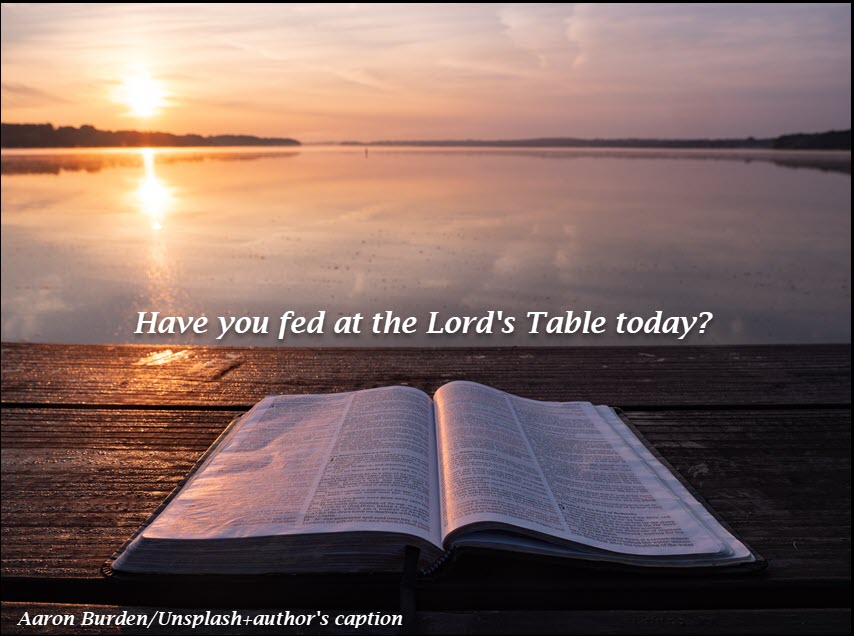Our world is replete with grocery markets, restaurants. What do the Levitical Dietary Laws have to do with us today?
 Leviticus 11 “What’s for Dinner” is a question heard around the world! We all love to eat! Of course, we are speaking tongue in cheek here regarding that question because we are offered so many choices! It was not so near Mt. Sinai when God gave these dietary laws. The Lord spoke this chapter to Moses and Aaron that they might know His standards regarding what foods were clean and unclean as they lived their nomadic lifestyle. Now they were people of the book, people of Jehovah and were to be different and to follow these regulations as a separated people. They were not to be like the idolaters of the nations around them.
Leviticus 11 “What’s for Dinner” is a question heard around the world! We all love to eat! Of course, we are speaking tongue in cheek here regarding that question because we are offered so many choices! It was not so near Mt. Sinai when God gave these dietary laws. The Lord spoke this chapter to Moses and Aaron that they might know His standards regarding what foods were clean and unclean as they lived their nomadic lifestyle. Now they were people of the book, people of Jehovah and were to be different and to follow these regulations as a separated people. They were not to be like the idolaters of the nations around them.
Remember James as he spoke to the dispersed believers? He did not mince words but told them that if they were friends with the world’s system that they were in enemies of God. That is why James hammered home their walk, talk, and their lifestyle. They must not mimic the world. Like Paul, he was saying they were to “come out from among them and be separate.” Thus Moses and Aaron are to teach the people these principles so they can be a holy separated people group. Thus God set a standard beginning with the most basic necessity—what foods were clean and what foods were unclean. There was essentially nothing wrong with those animals listed but the prohibition was to teach a symbolic lesson of what separateness means.
So the question is before us, do those around us see us as a different people group? In other words, when the world sees us what do they see? Does our life mimic the world or are we a people who choose God’s ways?

 Leviticus 10
Leviticus 10  In the NT, James the brother of Jesus calls himself a bondservant. As he writes he is not only looking at his present circumstances but those of his flock who are scattered calling them to holiness. That calling began way back here in the book of Leviticus through the sacrificial system. Each day the priests were met with perhaps hundreds of people who inadvertently or actually sinned. The line outside the Tabernacle stretched “around the block” so to speak. The priests worked from dawn to dusk helping people to atone for their sins. Leviticus paints for us a graphic picture of the various sacrifices with one purpose: holiness before a Holy God is costly. It was hard, arduous and time-consuming and why Christ came as the completed atonement. Remember in Acts 15 when the church council was discussing how to handle problems? In the middle of this came a booming voice of Paul “Why are you putting God to the test by placing on the neck of the disciples a yoke that neither our ancestors nor we have been able to bear?”
In the NT, James the brother of Jesus calls himself a bondservant. As he writes he is not only looking at his present circumstances but those of his flock who are scattered calling them to holiness. That calling began way back here in the book of Leviticus through the sacrificial system. Each day the priests were met with perhaps hundreds of people who inadvertently or actually sinned. The line outside the Tabernacle stretched “around the block” so to speak. The priests worked from dawn to dusk helping people to atone for their sins. Leviticus paints for us a graphic picture of the various sacrifices with one purpose: holiness before a Holy God is costly. It was hard, arduous and time-consuming and why Christ came as the completed atonement. Remember in Acts 15 when the church council was discussing how to handle problems? In the middle of this came a booming voice of Paul “Why are you putting God to the test by placing on the neck of the disciples a yoke that neither our ancestors nor we have been able to bear?”
 Exodus 35-37
Exodus 35-37


 Exodus 8-10
Exodus 8-10 Exodus 5 -7
Exodus 5 -7